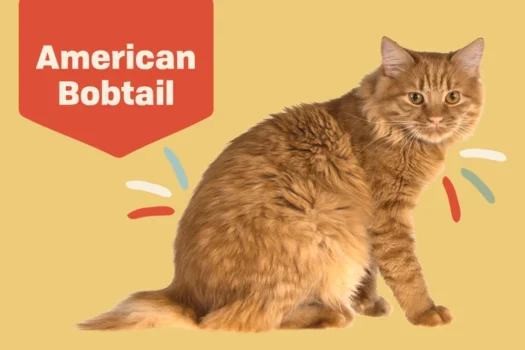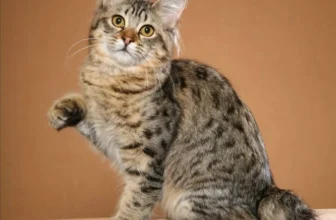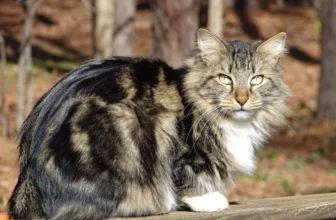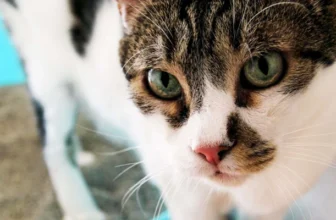As a cat owner, you want your feline friend to live a long, happy, and healthy life. However, genetic disorders can impact the health of American Bobtail cats, which can be concerning for pet owners. Managing the care of American Bobtail cats with genetic disorders can be a complex and challenging task that requires close attention and specialized care. In this article, we will provide you with a comprehensive guide on understanding, diagnosing, treating, preventing, and caring for American Bobtail cats with genetic disorders. By following our step-by-step instructions, you can ensure your cat gets the best possible care, which will ease your worries and ensure your four-legged friend’s happy and healthy life.
Understanding Genetic Disorders in American Bobtail Cats
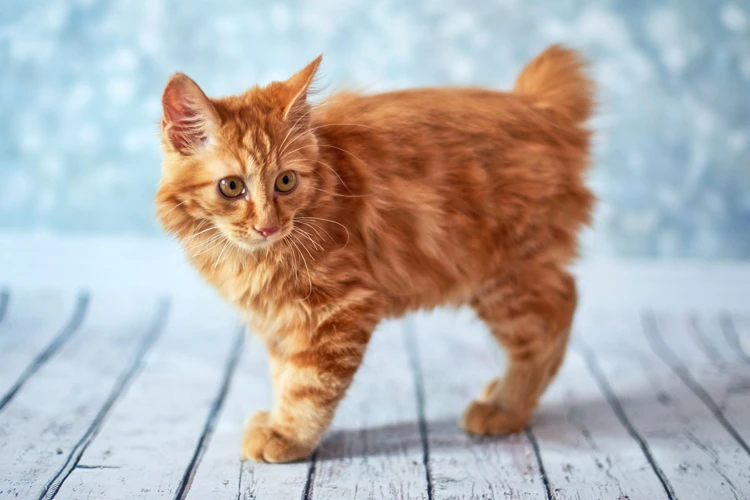
Understanding the genetic makeup of your American Bobtail cat can be crucial in ensuring their health and well-being. Genetic disorders are not uncommon in cats and can cause various health problems at different stages of life. Some of these disorders are inherited and can be passed down from one generation to the next. It’s important to be aware of the signs and symptoms of these disorders, as well as how to prevent and manage them. In this section, we will delve into the world of genetic disorders in American Bobtail cats, including the most common ones, diagnosis, and treatment options. By understanding the basics of genetic disorders, you’ll be better equipped to keep your furry friend healthy and happy.
What are Genetic Disorders in American Bobtail Cats?
Genetic disorders in American Bobtail cats are abnormalities or variations in the DNA that can be passed down from one generation to another. These disorders may affect the cat’s physical appearance, behavior, health, or a combination of these factors.
While all cats are at risk for genetic disorders, some breeds, like American Bobtail cats, may have a higher incidence of certain disorders due to their genetic makeup.
To better understand the type of genetic disorders American Bobtail cats may face, the following table outlines some of the most common genetic disorders in this breed:
| Genetic Disorder | Description |
|---|---|
| Polycystic kidney disease (PKD) | A genetic condition that causes the growth of multiple cysts in the kidneys, leading to kidney failure. |
| Hypertrophic Cardiomyopathy (HCM) | A common heart disease that causes the walls of the heart to thicken, making it difficult for the heart to pump blood effectively. |
| Progressive Retinal Atrophy (PRA) | A group of genetic diseases that cause progressive degeneration of the retina, leading to blindness. |
| Spinal Muscular Atrophy (SMA) | A genetic disorder that affects the muscles of the limbs, chest, and spine, leading to muscle weakness and inactivity. |
| Myotonia Congenita (MC) | A genetic disorder that causes muscle stiffness and weakness, particularly in the muscles of the head and limbs. |
It is essential for American Bobtail cat owners to be aware of these genetic disorders and observant of their cats’ behaviors and physical health. Regular check-ups with a veterinarian, as well as genetic testing, can help to diagnose any conditions early on and manage them effectively.
To learn more about how to prevent genetic disorders in American Bobtail cats, please visit our article on the importance of responsible breeding and genetic testing for American Bobtail cats.
Common Genetic Disorders in American Bobtail Cats
Common Genetic Disorders in American Bobtail Cats:
American Bobtail cats are generally healthy and not susceptible to many health problems. However, as with any breed, certain genetic disorders may arise. Below are some of the most common genetic disorders found in American Bobtail cats:
- Hypertrophic Cardiomyopathy (HCM): HCM is a heart condition that causes thickening of the heart walls, making it difficult for the heart to function correctly. This condition can lead to heart failure if left untreated. Symptoms of HCM may include lethargy, loss of appetite, difficulty breathing, and fainting.
- Feline Lower Urinary Tract Disease (FLUTD): FLUTD is a general term used to describe a variety of bladder and urinary tract conditions. These conditions can cause symptoms such as frequent urination, blood in the urine, and difficulty urinating.
- Progressive Retinal Atrophy (PRA): PRA is an eye disorder that can lead to blindness in American Bobtail cats. This condition causes a gradual degeneration of the retina, resulting in vision loss over time. Early signs of PRA may include night blindness and dilated pupils.
- Polycystic Kidney Disease (PKD): PKD is a kidney disorder that causes fluid-filled cysts to develop on the kidneys, interfering with their normal function. Symptoms may include increased thirst, frequent urination, weight loss, and vomiting.
- Polyneuropathy: Polyneuropathy is a nervous system disorder that can affect American Bobtail cats. This condition causes weakness in the legs as well as muscle wasting. Symptoms of polyneuropathy may include difficulty walking, trembling, and loss of coordination.
It is essential to recognize the symptoms of genetic disorders in American Bobtail cats to ensure early diagnosis and treatment. Regular veterinary check-ups and genetic testing can help prevent or manage these conditions. If you suspect your American Bobtail cat may have a genetic disorder, take them to the vet as soon as possible for diagnosis and treatment. For more information about genetic disorders in American Bobtail cats, please visit our comprehensive guide.
Diagnosing Genetic Disorders in American Bobtail Cats
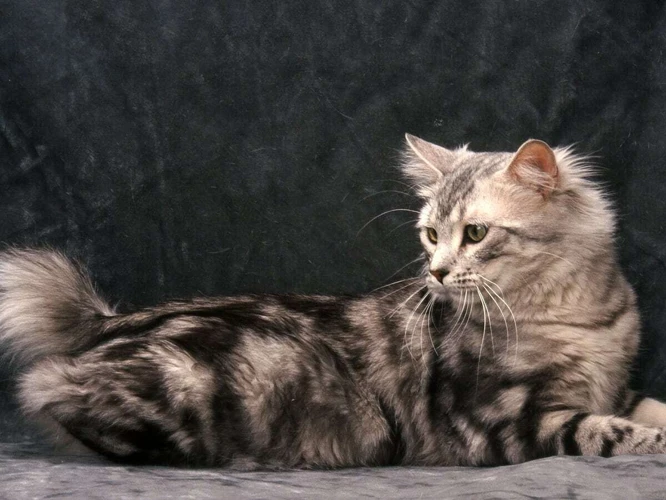
Determining if your American Bobtail cat has a genetic disorder can be a perplexing and challenging process. Without proper diagnosis, it is difficult to provide appropriate treatment. In this section, we will discuss the various methods used by veterinarians to diagnose genetic disorders in American Bobtail cats, including recognizing signs and symptoms, performing veterinary tests, and conducting genetic testing. It’s essential to recognize the importance of timely and correct diagnosis to manage the care of your cat effectively. Learn more about diagnosing genetic disorders in American Bobtail cats at [insert internal link to /genetic-disorders-american-bobtail-cats/].
Signs and Symptoms of Genetic Disorders
Genetic disorders are inherited conditions that affect American Bobtail cats of all ages. It is essential to be aware of the signs and symptoms of these disorders to identify them early and manage them appropriately. Here is an overview of the common signs and symptoms of genetic disorders in American Bobtail cats:
| Genetic Disorder | Signs and Symptoms |
|---|---|
| Polycystic Kidney Disease (PKD) | Frequent urination, blood in urine, loss of appetite, weight loss |
| Hypertrophic Cardiomyopathy (HCM) | Shortness of breath, lethargy, coughing, arrhythmia, sudden collapse |
| Spina Bifida | Paralysis, urinary or fecal incontinence, hind limb weakness, abnormal gait |
| Retinal Atrophy | Night blindness, dilated pupils, cloudy eyes, vision loss |
| Progressive Retinal Atrophy (PRA) | Reduced vision in low light, increased reflectivity in the eye, cataracts |
| Pyruvate Kinase Deficiency (PKD) | Weakness, rapid breathing, jaundice, lethargy, abdominal distension |
It is worth noting that some genetic disorders may show no signs or symptoms during the early stages, making diagnosis difficult. Regular veterinarian check-ups are essential to detect and prevent the worsening of these genetic disorders.
If you want to learn more about genetic disorders in American Bobtail cats, check out our article on Bobtail Cat Genetic Disorders. Also, read our article on the Importance of Responsible Breeding to Prevent Genetic Disorders in American Bobtail Cats to understand how responsible breeding can help avoid genetic disorders in cats. Additionally, genetic testing can help detect these disorders early, and you can learn more about it in our article on Genetic Testing in American Bobtail Cats.
Veterinary Tests for Genetic Disorders
Veterinary tests play a crucial role in diagnosing genetic disorders in American Bobtail cats. These tests are typically recommended by a veterinarian if they suspect a cat has a genetic disorder based on their physical examination and medical history. Here are some common veterinary tests used to diagnose genetic disorders in American Bobtail cats:
| Test | Description |
|---|---|
| Genetic Testing | This test involves taking a sample of a cat’s DNA and analyzing it for gene mutations or abnormalities that may contribute to a genetic disorder. |
| Blood Tests | Blood tests can help identify certain gene mutations, as well as provide a general indication of a cat’s overall health and whether they are at risk for certain disorders. |
| Urinalysis | Urinalysis can help identify the presence of certain substances in a cat’s urine that may indicate a genetic disorder, such as the presence of crystal formation in cats with polycystic kidney disease. |
| X-rays and Ultrasound | Imaging tests can help identify physical abnormalities in a cat’s bones, organs, and tissues that may contribute to a genetic disorder, such as hip dysplasia or heart defects. |
It’s important to note that veterinary tests are not always definitive and may only provide a partial or inconclusive diagnosis. In some cases, a cat may need to undergo multiple tests to determine the root cause of their genetic disorder. However, early detection of genetic disorders through veterinary testing can allow for timely treatment and management, which can improve a cat’s quality of life.
It’s important to take preventative measures to avoid genetic disorders altogether. Learn more about how to avoid genetic disorders in American Bobtail cats.
Treating Genetic Disorders in American Bobtail Cats
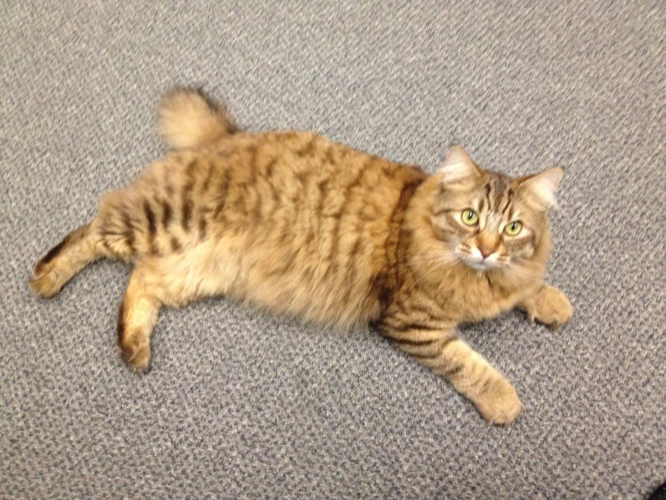
Genetic disorders in American Bobtail Cats can be challenging to manage, but with the right treatment, many of these conditions can be dealt with effectively. Treating genetic disorders in these cats typically involves a combination of medications, dietary and lifestyle changes, and veterinary procedures. It can be overwhelming to deal with a cat’s genetic disorder, but providing proper treatment is essential to maintaining their health and well-being. Let’s explore the different methods of treatment for genetic disorders in American Bobtail Cats. And don’t forget, taking preventative measures can help reduce the likelihood of your cat developing genetic disorders. Read more on how to /avoid-genetic-disorders-american-bobtail-cats/ here.
Medications and Supplements
When it comes to treating genetic disorders in American Bobtail cats, medications and supplements are often necessary. The specific medication or supplement recommended will depend on the type of disorder and the severity of the symptoms. Some commonly prescribed medications and supplements for managing genetic disorders in American Bobtail cats are listed in the table below:
| Medication/Supplement | Function | Possible Side Effects |
|---|---|---|
| Antibiotics | Treat bacterial infections that can occur as a result of a weakened immune system | Diarrhea, vomiting |
| Steroids | Reduce inflammation and swelling associated with a number of genetic disorders | Increased thirst and hunger, weight gain, behavior changes |
| Antihistamines | Reduce itching and inflammation associated with allergic reactions | Drowsiness, dry mouth, digestive issues |
| Glucosamine and chondroitin supplements | Improve joint health in cats with genetic musculoskeletal disorders | None reported, but may interact with other medications |
| B-complex vitamins | Support overall health and immune function | None reported, but may cause upset stomach if taken on an empty stomach |
It’s important to note that all medications and supplements should be given under the guidance of a veterinarian, as dosages and potential side effects can vary depending on the cat’s individual needs and health status. It’s also important to closely monitor a cat’s response to any medication or supplement and report any concerning symptoms to the veterinarian immediately. In some cases, medication and supplement treatment may need to be adjusted or discontinued based on a cat’s response.
Dietary and Lifestyle Changes
American Bobtail cats with genetic disorders may benefit from certain dietary and lifestyle changes. These changes can help manage symptoms, improve overall health, and increase lifespan. Here are some dietary and lifestyle adjustments that can help:
| Adjustment | Description |
| Specialized Diets | Depending on the specific genetic disorder, a specialized diet may be recommended by the vet. This can help alleviate symptoms and improve overall health. For example, cats with kidney disease may need a diet low in protein, while cats with allergies may need a diet free of specific ingredients. |
| Regular Exercise | Exercise helps keep cats at a healthy weight, improve muscle mass, and promote good cardiovascular health. Regular playtime and engaging in interactive activities with your American Bobtail cat can help manage conditions like arthritis or obesity. |
| Supplements | Supplements can help fill in any nutritional gaps that your cat may have. Additionally, specific supplements like omega-3 and glucosamine may help manage symptoms of certain genetic disorders – for example, omega-3 may help with inflammation and glucosamine may help with joint health. |
| Stress Reduction | Cats with genetic disorders may be more sensitive to stress, which can exacerbate their symptoms. Providing a calm and relaxing environment through techniques like pheromone sprays or diffusers, as well as minimizing changes in daily routine, can help reduce stress levels and decrease symptoms of disorders like feline idiopathic cystitis. |
| Regular Vaccinations | Keeping up with regular vaccinations can help prevent your American Bobtail cat from contracting any preventable illnesses that may weaken their immune system and exacerbate symptoms of genetic disorders they may have. |
It’s important to keep in mind that every cat with a genetic disorder is unique, and their dietary and lifestyle changes should be tailored to their specific needs. It’s best to work with your vet to determine which adjustments will be most effective for managing their condition.
Veterinary Procedures
Veterinary procedures are an option for managing genetic disorders in American Bobtail cats. These procedures may include surgery or other medical interventions.
Surgery: In some cases, surgery may be recommended to correct issues caused by genetic disorders. For example, American Bobtail cats with hip dysplasia may benefit from a surgical procedure to replace the affected joint. Similarly, cats with congenital heart defects may need surgery to correct the issue.
Therapeutic laser treatment: Therapeutic laser treatment is a noninvasive therapy that can help alleviate pain and inflammation caused by genetic disorders such as arthritis. The laser’s energy penetrates deep into the affected tissues and stimulates healing, reducing the need for medication.
Acupuncture: Acupuncture is another noninvasive therapy that may be helpful for managing genetic disorders in American Bobtail cats. This ancient practice involves the insertion of thin needles into specific points on the body to stimulate natural healing processes. Acupuncture has been shown to be effective in reducing pain, inflammation, and other symptoms related to genetic disorders.
Physical therapy: Physical therapy can help improve mobility, strength, and flexibility in American Bobtail cats with genetic disorders that affect their musculoskeletal system. This may include exercises, massage, hydrotherapy, and other techniques designed to improve the cat’s overall function.
Chiropractic: Chiropractic care can be helpful for American Bobtail cats suffering from structural or musculoskeletal disorders. Treatment involves the use of gentle spinal manipulations to realign the spine and improve nerve function, which can help alleviate pain and improve overall health.
It’s important to note that not all veterinary procedures are appropriate for all cats or all genetic disorders. Additionally, some procedures may be costly and may not be covered by pet insurance. It’s important to discuss the pros and cons of any veterinary procedures with your cat’s veterinarian to determine which options are best for your American Bobtail cat’s unique situation.
| Veterinary Procedure | Description | Potential Benefits | Potential Risks |
|---|---|---|---|
| Surgery | A medical procedure to correct issues caused by genetic disorders such as hip dysplasia or congenital heart defects | Improved mobility and function; improved quality of life | Potential for complications during or after surgery; may be expensive |
| Therapeutic Laser Treatment | A noninvasive therapy that can help alleviate pain and inflammation caused by genetic disorders such as arthritis | Reduced need for medication; improved mobility and function; reduced pain and inflammation | May require multiple treatments; may be expensive |
| Acupuncture | A noninvasive therapy that involves the insertion of thin needles into specific points on the body to stimulate natural healing processes | Reduced pain and inflammation; improved overall health and function | May require multiple treatments; may not be appropriate for all cats; may be costly |
| Physical Therapy | Exercises, massage, hydrotherapy, and other techniques designed to improve the cat’s overall function | Improved mobility, strength, and flexibility; improved quality of life | May require ongoing treatment; may be costly |
| Chiropractic | Gentle spinal manipulations to realign the spine and improve nerve function, which can help alleviate pain and improve overall health | Reduced pain and inflammation; improved overall health and function | May not be appropriate for all cats; may require ongoing treatment; may be costly |
Preventing Genetic Disorders in American Bobtail Cats
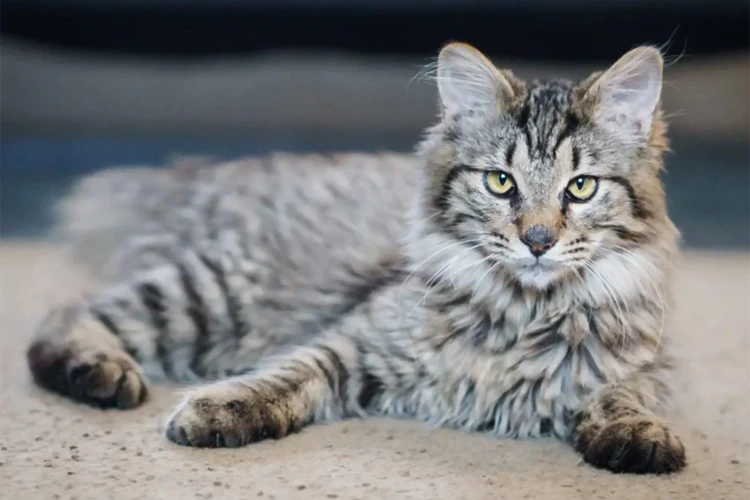
As a responsible pet owner, it’s crucial to take steps to prevent genetic disorders in your American Bobtail cat. While not all genetic disorders can be prevented, there are actions you can take to minimize the risk of passing on these conditions. By being proactive and informed, you can help ensure that your furry friend enjoys a healthy and happy life free from genetic afflictions. Let’s dive into some key strategies for preventing genetic disorders in American Bobtail cats.
Breeding Practices
When it comes to managing genetic disorders in American Bobtail cats, breeding practices play an important role in minimizing the risk of passing on these disorders to future generations. Responsible breeding practices for American Bobtail cats with genetic disorders include:
- Choosing the right breeding pairs: When selecting breeding pairs, it is important to ensure that neither of the cats has the same genetic disorder. Genetic testing can help identify carriers of these disorders.
- Maintaining genetic diversity: Inbreeding or breeding close relatives can increase the likelihood of genetic disorders. It is important to maintain genetic diversity in the breeding pool.
- Avoiding breeding cats with severe genetic disorders: Breeding cats with severe genetic disorders can result in kittens with severe symptoms that may be difficult to manage.
- Monitoring kitten development: It is important to monitor the health and development of kittens born to cats with genetic disorders. If a kitten displays symptoms of the disorder, it should not be used for breeding.
- Screening for other health issues: In addition to genetic disorders, it is important to screen breeding cats for other potential health issues such as infectious diseases, heart conditions, and eye disorders.
By following these breeding practices, breeders can help minimize the risk of passing on genetic disorders and ensure that future generations of American Bobtail cats are healthy and happy. It is important for breeders to prioritize the welfare of these cats above any potential profit or personal gain.
Genetic Testing
Genetic testing for American Bobtail cats is an essential tool in preventing the passing of genetic disorders from one generation to the next. It involves identifying the presence or absence of specific genes that may cause genetic disorders in American Bobtail cats. The testing process typically involves extracting a small blood sample from the cat and analyzing its DNA.
One of the most commonly used genetic tests is the DNA test. This test is used to detect the presence of specific mutations in genes responsible for causing genetic disorders such as hypertrophic cardiomyopathy and polycystic kidney disease. This test can help breeders to identify carriers of genetic disorders, which can be helpful in preventing the condition from being passed on to future generations.
Another type of genetic test is the carrier test. This test helps determine if a cat is carrying a specific gene mutation responsible for a particular genetic disorder but is not showing symptoms of the disease. This type of testing is important for breeding cats, as it helps breeders avoid mating two carriers that can produce offspring with a higher risk of developing the disorder. It is recommended that breeders test their cats for genetic disorders before breeding to ensure that they are not passing on inherited diseases to future generations.
Genetic testing can also be used to identify the lineage of a cat. This information can be useful to cat owners in determining any potential genetic disorders that may be present in their cat’s family history. The results of genetic testing can also help veterinarians in diagnosing and treating any symptoms and complications that may arise due to genetic disorders.
Genetic testing is a critical tool in managing the care of American Bobtail cats with genetic disorders. The following table highlights some of the commonly used genetic tests for American Bobtail cats:
| Genetic Test | Description |
|---|---|
| DNA Test | Used to detect the presence of specific mutations responsible for genetic disorders |
| Carrier Test | Identifies if a cat is a carrier for a specific gene mutation responsible for a particular genetic disorder but is not showing symptoms |
| Lineage Identification | Identifies the cat’s lineage and any potential genetic disorders that may be present in their family history |
Genetic testing can help cat owners and breeders make more informed decisions about the management, care, and breeding of American Bobtail cats with genetic disorders. With the use of genetic testing, breeders can take proactive measures to prevent the passing of genetic disorders from one generation to the next, while cat owners can ensure proper care and management for their furry friends.
Careful Selection of American Bobtail Cats
When looking to prevent genetic disorders in American Bobtail cats, it is important to start with careful selection of the breeding cats. Breeders should only breed cats which are healthy and free of genetic disorders. Screening for genetic conditions before selecting breeding cats is essential to minimize the chances of producing batches of kittens with genetic disorders.
- Research: Take the time to research the breeder and their breeding practices, inquire about their health testing protocols, ask for testimonials from previous buyers, and vet referrals.
- Health Testing: Before breeding, both the female and male American Bobtail cats must go through a series of health tests. Testing checks for genetic conditions such as hip dysplasia, feline hypertrophic cardiomyopathy, progressive retinal atrophy, and other health conditions that may affect the cat and its offspring.
- Lineage: Check the lineage of the cats being considered for breeding. Those with a history of genetic disorders should not be chosen as breeding cats.
- Siblings: Do not breed siblings or those that are closely related. Inbreeding increases the chances of producing kittens with genetic disorders.
- Mutliple matings: Ensure mating between different cats and avoid mating the same cats over and over. The same mistake leads to the repetition of genetic issues in each final litter.
By selecting healthy breeding cats using these breeding practices, breeders have a better chance to produce genetically healthy American Bobtail cats.
Caring for American Bobtail Cats with Genetic Disorders
Feline genetic disorders can be a challenging issue for any cat owner to navigate, but with proper care and management, American Bobtail cats can still live a happy and comfortable life. It’s important to provide a safe and comfortable home environment, monitor and manage symptoms, and schedule regular veterinary check-ups. In this section, we will explore some of the best ways to care for American Bobtail cats with genetic disorders, so you can feel confident in providing your furry friend with the best possible care.
Providing a Safe and Comfortable Home Environment
American Bobtail cats with genetic disorders need a safe and comfortable home environment to cope with their condition(s). Here are some tips to ensure your cat is comfortable and healthy:
| 1. Safe Space | American Bobtail cats with genetic disorders may have mobility issues or be prone to accidents, so it’s important to create a safe space for them. Keep dangerous objects out of reach and use baby gates or closed doors to prevent access to dangerous areas. |
| 2. Comfortable Sleeping Area | Provide your cat with a comfortable sleeping area that is free from drafts and extremes in temperature. Many cats with genetic disorders may require extra padding or support to help them sleep, so consider adding a soft bed or cushion. |
| 3. Easy Access to Food and Water | American Bobtail cats with genetic disorders may have difficulty reaching food and water dishes, so ensure they are at a comfortable height and easily accessible. Consider using a raised feeding station or automatic water fountain to prevent spills and provide continuous access to freshwater. |
| 4. Keep it Clean | Clean and disinfect your cat’s litter box regularly to prevent the spread of bacteria and viruses. Keeping your home clean will also help reduce the risk of respiratory issues in cats with genetic disorders who may be more sensitive to environmental allergens. |
| 5. Provide Enrichment | Just like any other cat, American Bobtail cats with genetic disorders need mental stimulation and playtime. Provide toys and scratching posts to keep them entertained and engaged. However, take care to supervise playtime and ensure it doesn’t exacerbate their condition(s). |
By following these tips, you can create a safe and comfortable home environment for your American Bobtail cat with genetic disorders. However, it’s important to note that every cat is different, and some may have unique needs or preferences. Consult with your veterinarian for additional advice and recommendations specific to your cat’s condition.
Monitoring and Managing Symptoms
It is important for cat owners to be aware of the signs and symptoms of genetic disorders in American Bobtail cats, as early detection can help in managing the condition effectively. Once a genetic disorder has been diagnosed, it is crucial to monitor the cat for any changes in symptoms or behavior. Here are some tips for monitoring and managing symptoms of genetic disorders in American Bobtail cats:
1. Keep a Record:
Keep a record of all symptoms and behaviors that you observe in your American Bobtail cat. This can help in identifying any changes that may occur over time.
2. Watch for Signs of Discomfort:
Watch out for signs of discomfort, such as limping, chewing on paws, or excessive grooming. These may indicate pain or discomfort associated with the genetic disorder.
3. Provide Comfortable Living Environment:
Provide a comfortable living environment for your American Bobtail cat, with enough space to move around and easy access to food and water. This will minimize stress and discomfort, and help in managing the symptoms of the genetic disorder.
4. Administer Medications and Supplements:
If your American Bobtail cat is on any medications or supplements, make sure to administer them as prescribed by your veterinarian. Regular intake of medications and supplements can help in controlling the symptoms of the genetic disorder.
5. Adjust Diet and Exercise:
Modify your cat’s diet and exercise routine in consultation with your veterinarian, based on their specific needs. This can help in managing the symptoms of the genetic disorder.
6. Regular Vet Check-Ups:
Schedule regular check-ups with your veterinarian to monitor your American Bobtail cat’s condition and to make adjustments in the treatment plan as needed. Regular check-ups can also help in detecting any new symptoms or changes in behavior.
Regular Veterinary Check-Ups
Regular veterinary check-ups can help ensure the health and well-being of your American Bobtail cat, especially if they have a genetic disorder. These check-ups are important because they allow veterinarians to monitor your cat’s condition, identify any changes or concerns, and provide necessary treatment or adjustments to their care plan. According to The American Veterinary Medical Association, cats should have regular veterinary visits at least once a year, and more frequently for older cats or those with chronic conditions or genetic disorders.
During a regular veterinary check-up, your veterinarian will conduct a complete physical examination, including looking at their eyes, ears, nose, mouth, skin, and coat. They may also listen to their heart and lungs, palpate their abdomen, and check their joint mobility. In addition to the physical exam, they may also recommend additional tests or procedures based on your cat’s specific condition or genetic disorder. These may include blood work, urine analysis, imaging tests, or genetic testing.
Regular veterinary check-ups also provide an opportunity to discuss any concerns or questions you may have about your cat’s care. This may include suggestions for adjusting their diet, exercise routine, or medications if necessary. It is important to be open and honest with your veterinarian about any changes in your cat’s behavior, appetite, or overall health, as even small changes could be an indication of a larger issue.
To ensure that you remember to schedule regular veterinary check-ups, it can be helpful to create a schedule or table to keep track of your cat’s appointments. This can be easily done using an HTML table, which can be customized and formatted to fit your needs. See the example below:
| Appointment Date | Reason for Visit | Tests/Procedures | Notes/Recommendations |
|---|---|---|---|
| June 15, 2021 | Regular Check-Up | Physical Exam, Blood Work, Urine Analysis | Overall good health, continue current diet and exercise routine |
| December 1, 2021 | Follow-Up Visit | Imaging Tests to monitor genetic disorder | Minimal changes in condition, continue with current treatment plan |
By keeping track of your cat’s appointments in a table like this, you can easily reference past visits and stay organized for future ones, ensuring that your American Bobtail cat with a genetic disorder is receiving the care and attention they need to maintain optimal health.
Conclusion
In conclusion, managing the care of American Bobtail cats with genetic disorders can be challenging, but it is not impossible. It requires a combination of understanding, prevention, and treatment. By understanding the potential genetic disorders that American Bobtail cats can inherit, cat owners can take steps to prevent them from occurring. This may involve careful breeding practices, genetic testing, and selecting cats with a lower risk of genetic disorders.
Diagnosing genetic disorders as soon as possible is crucial in maintaining the quality of life for American Bobtail cats. Owners should be aware of the signs and symptoms of genetic disorders and should not hesitate to take their cat to the vet if any concerning symptoms arise. A specialized veterinary test will then help diagnose the disorder.
Treatment of genetic disorders varies depending on the specific condition. Medications, supplements, dietary changes, and veterinary procedures can all be used to manage genetic disorders in cats. Owners should work closely with their veterinarian to come up with an appropriate treatment plan that meets their cat’s unique needs.
Caring for a cat with a genetic disorder requires lifelong commitment and care. Owners should provide a safe and comfortable home environment for their cat, and monitor and manage symptoms regularly. Regular veterinarian check-ups are also important to maintaining the overall health of the cat.
Overall, caring for American Bobtail cats with genetic disorders can be challenging, but it is also extremely rewarding. With proper understanding, prevention, and treatment, owners can provide their cats with a high quality of life, despite their genetic conditions.
Frequently Asked Questions
What are the most common genetic disorders in American Bobtail cats?
Some of the most common genetic disorders in American Bobtail cats include hypertrophic cardiomyopathy, hip dysplasia, and progressive retinal atrophy.
How can I tell if my American Bobtail cat has a genetic disorder?
Signs of genetic disorders in American Bobtail cats can vary depending on the specific condition, but may include limping, changes in appetite or weight, difficulty breathing, or changes in behavior. It’s important to schedule regular veterinary check-ups for your cat to help identify any potential issues early.
What tests will my veterinarian use to diagnose genetic disorders in my American Bobtail cat?
Your veterinarian may use a variety of diagnostic tests to identify genetic disorders in American Bobtail cats, such as blood tests, x-rays, and genetic testing. They may also ask detailed questions about your cat’s medical history and behavior.
How are genetic disorders in American Bobtail cats treated?
The treatment for genetic disorders in American Bobtail cats will vary depending on the specific condition and severity of symptoms. Treatments may include medications, dietary and lifestyle changes, and veterinary procedures such as surgery or physical therapy.
Can I prevent genetic disorders in my American Bobtail cat?
While genetic disorders cannot always be prevented, there are steps you can take to reduce the risk of your cat developing them. Practice responsible breeding practices, such as genetic testing, and provide your cat with a healthy diet and lifestyle to help keep them in the best health possible.
What is progressive retinal atrophy?
Progressive retinal atrophy is a genetic disorder that can affect American Bobtail cats, causing the progressive degeneration of the retina and eventual blindness. There is no cure for this condition, but early diagnosis and management can help slow the progression of symptoms.
What dietary changes can help manage genetic disorders in American Bobtail cats?
Depending on the specific genetic disorder, dietary changes may be recommended to help manage symptoms. For example, cats with hypertrophic cardiomyopathy may benefit from a low-sodium diet, while cats with hip dysplasia may benefit from weight management to reduce the strain on their joints.
How often should I take my American Bobtail cat to the veterinarian if they have a genetic disorder?
It’s important to follow your veterinarian’s recommendation for check-ups and follow-up appointments based on your cat’s specific needs. This may include regular check-ups every 6-12 months or more frequent visits for cats with more severe conditions.
What is the average lifespan of an American Bobtail cat?
The lifespan of an American Bobtail cat can vary depending on a variety of factors such as genetics, diet, and lifestyle. However, with proper care, American Bobtail cats typically live to be around 13-15 years old on average.
Can American Bobtail cats with genetic disorders still live happy and healthy lives?
Yes, with proper management and care, American Bobtail cats with genetic disorders can still live happy and healthy lives. It’s important to work closely with your veterinarian to develop a treatment plan that meets your cat’s individual needs.

